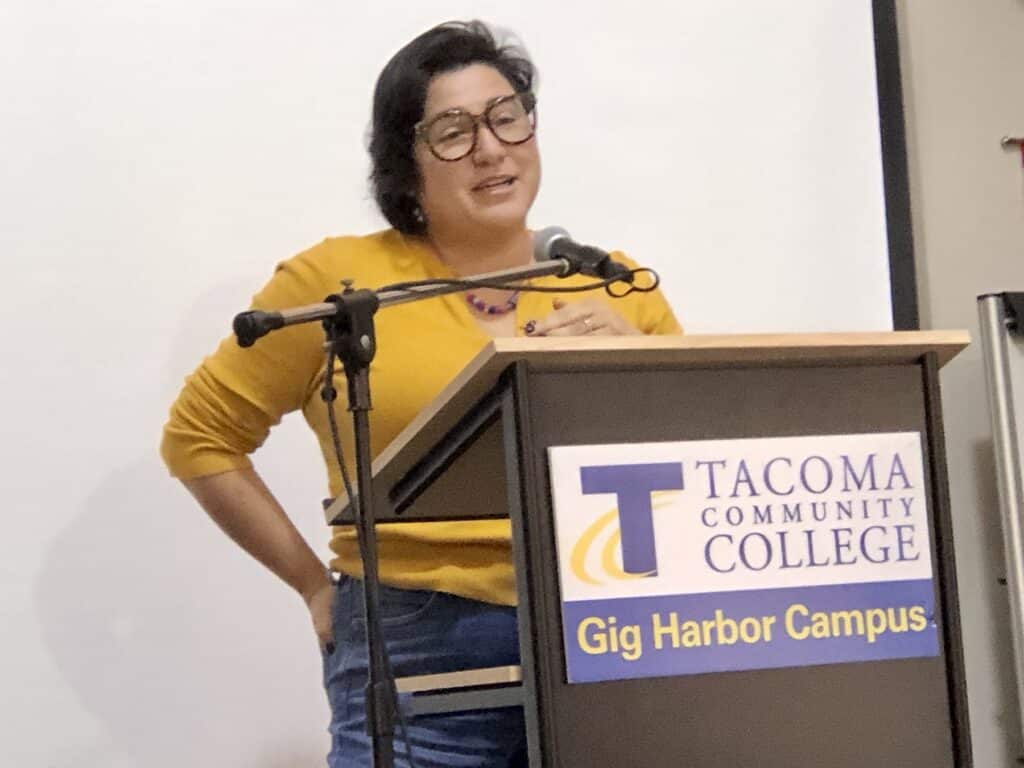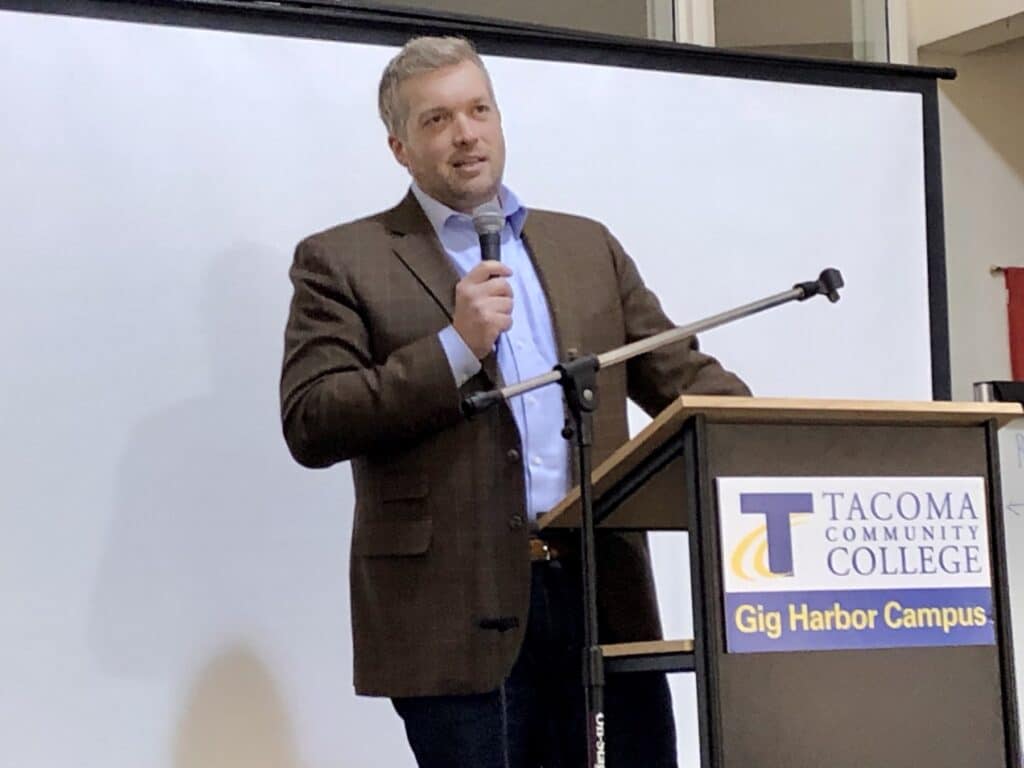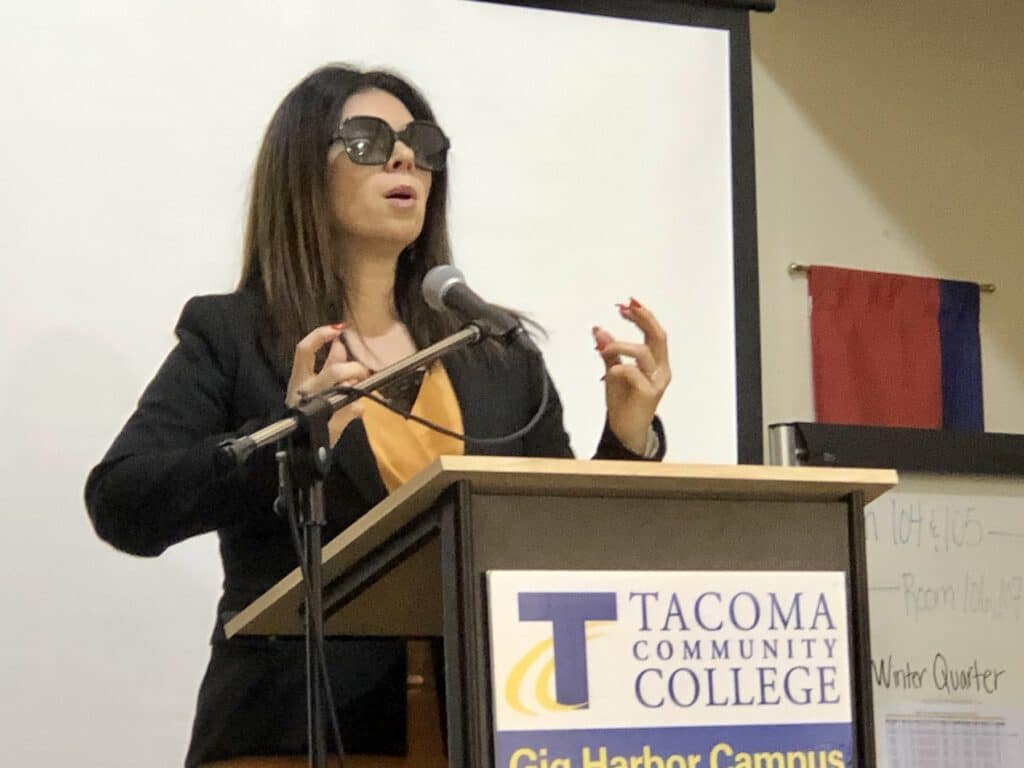Community Government
State legislators discuss priorities for short session
The 26th is unique among legislative districts, with both Democrat and Republican representation. Yet that doesn’t translate to hostile impasse, as often occurs in national politics.
“We intentionally work to work together,” Rep. Spencer Hutchins, R-Gig Harbor, told a legislative sendoff crowd hosted by the Gig Harbor Chamber of Commerce on Wednesday evening at Tacoma Community College’s Gig Harbor campus. It’s not Democrats versus Republicans and never the twain shall meet, he said. “We on purpose make sure that twain shall meet.”
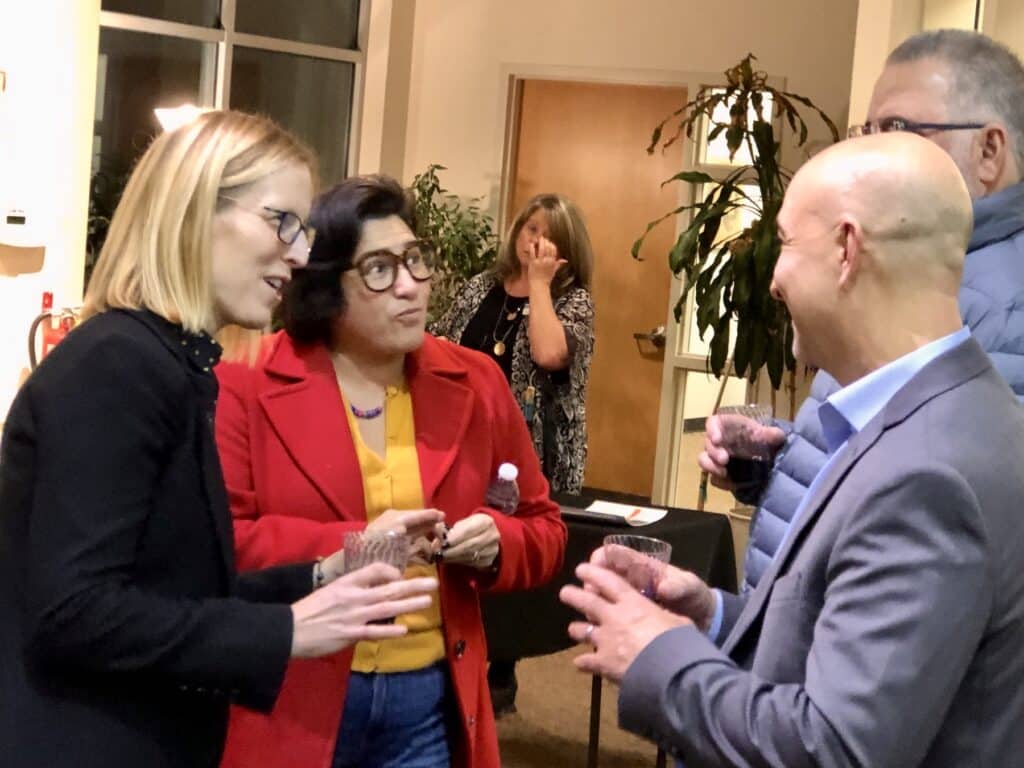
Sen. Emily Randall, in red, speaks with constituents before the legislative sendoff Wednesday. Photo by Ed Friedrich
Hutchins, Sen. Emily Randall, D-Bremerton, and Rep. Michelle Caldier, R-Gig Harbor, are preparing for a 60-day short session that runs from Jan. 8 through March 7. Legislators last year passed 2-year state budgets for operating expenses, transportation and capital projects. This year, they’ll adjust the budgets as money allows. They’ll also consider bills that didn’t pass and can consider new ones.
Of the state’s 49 districts, the 26th is one of just two with split representation. It stretches from Bremerton to the Narrows Bridge, including the Gig Harbor, Fox Island, Key Peninsula and South Kitsap areas. It is one of few “swing” districts in which both parties have decent shots to win seats, thus much money flows into its races.
Satisfying to work together
Hutchins, who’s entering his second year in office, said it can be frustrating to be a freshman in the minority party, “but it’s very satisfying to work together on good policy.”
Randall, who was re-elected to a second four-year term in November 2022, said local lawmakers are fortunate that constituents are more engaged than most.
“I feel lucky to be part of a delegation that works together,” she said. “I think it’s really important that we show up and respect each other.”
Caldier, who’s in the middle of her fifth two-year term, said: “In a swing district, there’s no way you’re going to make everybody happy, the three of us. I do think when we take our votes, we try our hardest to do what’s right.”
Randall, 39, announced in November that she’s running for the state’s Sixth Congressional District seat to replace Derek Kilmer, D-Gig Harbor, who’s leaving at the end of the year. She highlighted some of her and the Senate Democratic Caucus’s top priorities for the upcoming state session.
Randall’s priorities
- Building healthy communities, including continuing to expand access to substance use disorder treatment and detoxification. With help needed closer to homes, she is supporting a budget request for Olalla Recovery Centers.
- Building a healthy planet and strong economy. Washington state has high gas prices but also high profits at the pump. She’s pushing for transparency like the Legislature did on drug prices. “How do these costs develop. How much is environmental policies and how much is something else?”
- Community safety. Combatting hate crimes and anti-Semitism, and reducing youth crime to block the path to future misdeeds. That includes opening more regional law enforcement training facilities.
- Housing. Keeping people from getting thrown onto the street by being priced out of their homes.
- Education. Making Washington among the most affordable states to attend college or vocational/technical school. She announced Wednesday she is stepping down as chair of the Higher Education and Workforce Development Committee. It’s a career highlight, but “it’s time for me to make space for the next leader,” she said.
Hutchins, 38, was late for his first legislative sendoff last year after his car faltered and a priest picked him up. The event began right on time Wednesday.
“If I hear one more joke about breaking down on the highway,” he said. “I walked in here tonight and five people said they were so glad my car didn’t break down on the way.”
He said he hasn’t gotten over feeling he’s “just another dude” with an office under the Capitol rotunda.
“I walk into a giant marble building to do the work of the people,” said Hutchins, who co-owns a real estate company. “I carry with me the very normal guy things I live my everyday life with that you live your everyday lives with.”
Speeding up road projects
As a Transportation Committee member, Hutchins is concerned that large, expensive local projects such as the Gorst interchange, Fox Island bridge and Key Peninsula bypass keep getting delayed.
“The state is awash in cash with a record-breaking surplus,” he said. “Things are not working right in our transportation infrastructure-building world. How can we push things forward and make sure they don’t take so long?”
Other priorities include:
- Healthcare. Making sure doctors are reimbursed adequately so they’ll accept Medicaid patients. A new tax is being dangled to fund a fix. “If this is a proper priority of government, let’s fund it through the budget,” he said.
- Housing. Reducing barriers to create more housing which would bring prices down.
- Policing/Drugs. “I’m not done with the community safety conversation,” he said, citing police chase changes in particular.
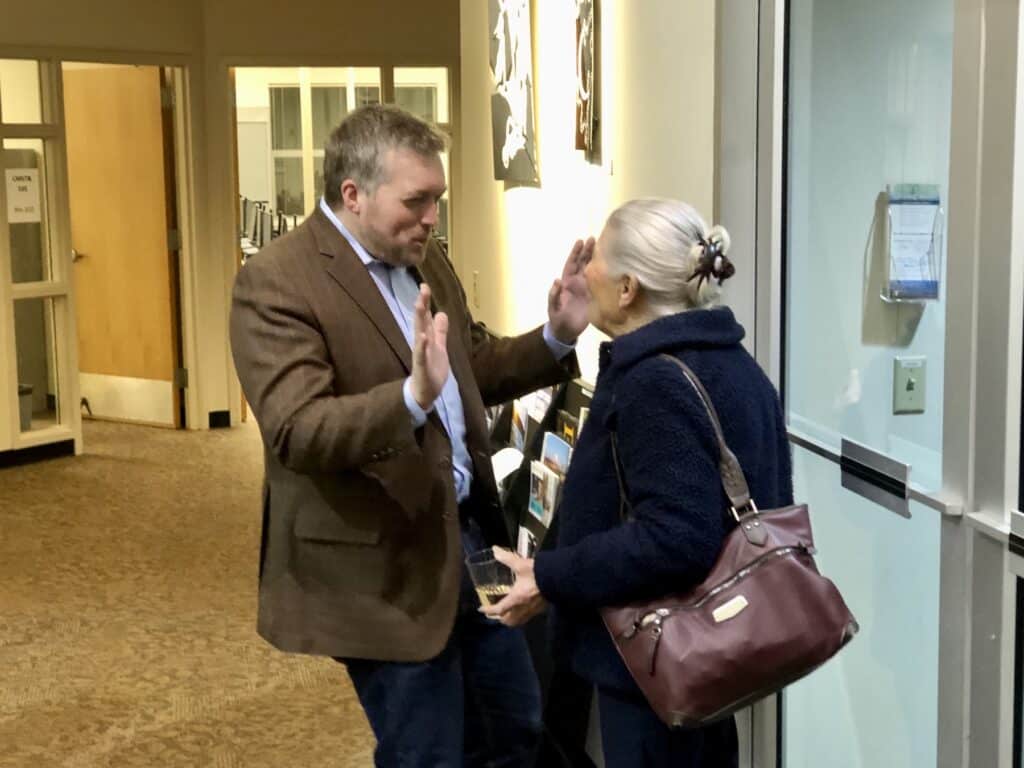
Rep. Spencer Hutchins speaks with a constituent Wednesday during the legislative sendoff. Photo by Ed Friedrich
“Quite literally, we listen and pay attention,” he said, noting he looks up bills to see how locals have weighed in. “I’m grateful for the level of engagement we have in this community.”
Caldier, 47, told Randall a year ago that the 2023 session will be interesting because she left the House Republican Caucus. She was right.
Eventful year for Caldier
On Wednesday she chronicled the travails of being a caucus of one after not receiving accommodations from Republican leadership needed to address her loss of sight. A rare form of glaucoma had taken all of the vision in her left eye and most of it in her right. She kept her struggles quiet, she said, because “I knew I could do the work,” but word eventually got out.
“I decided it was time for me to very quietly leave the caucus,” she said Wednesday. “It was a quiet protest of leadership.”
Caldier, a retired dentist, returned to the caucus last spring after minority leader J.T. Wilcox, R-Yelm, stepped down.
“I am very grateful we are moving forward,” she said. “I am still trying to get some help.”
Then in December, an independent investigation released by the chief clerk of the state House of Representatives alleged that she violated the body’s policies on abusive behavior and bullying. Caldier said the report was inaccurate and retribution for her resignation from the caucus.
Unsurprisingly, changing the culture of how House members are treated sits at the top of her to-do list. She said at some point she’d like to pass the baton to another community member, but not now.
“I’m going to continue to use my voice,” she said.
Looking at initiatives
A few bills got passed recently that the public was unaware of or doesn’t want, she said. They’ll be addressed through the initiative process. She’s looking at six proposals, including one to roll back the Climate Commitment Act.
“Even if I disagree with something, I feel I should vote the way the people want me to vote,” said Caldier.
Among bills she’s supporting is one to remove the cap on the number of special education students the state will fund in school districts. Like Hutchins, she wants to assure that Medicaid patients have an adequate network of providers. And she’d like high school students to be taught basic life support such as using a defibrillator and CPR.
“Hopefully, it will save some lives,” she said.
The legislative sendoff is sponsored annually by the Gig Harbor Chamber of Commerce and Tacoma Community College.

